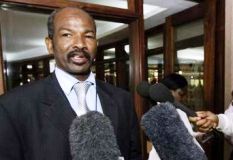Darfur rebels start talks for common position
August 3, 2007 (ARUSHA) — Darfur’s fractious rebel groups started key talks Friday to hammer out a united front paving the way for negotiations with the Khartoum government and an end to the deadly civil conflict.
 “For the first time in a long time, I have a feeling of hope for Darfur, a sense of opportunity not to be lost,” said top United Nations mediator Jan Eliasson in his opening remarks.
“For the first time in a long time, I have a feeling of hope for Darfur, a sense of opportunity not to be lost,” said top United Nations mediator Jan Eliasson in his opening remarks.
Asked when final settlement talks could take place, Eliasson’s African Union counterpart Salim Ahmed Salim told AFP: “Within the next two months.”
When the deadly conflict erupted in Darfur four and a half years ago, the uprising against the central authority in Khartoum was spearheaded by one group that was protesting the government’s “policies of maginalisation, racial discrimination, exclusion, exploitation and divisiveness.”
Now diplomats face the daunting task of finding common ground for a dozen rebel factions.
“Our objective is to find a common position. You cannot have negotiations with on the one hand, the Khartoum government, and seven, eight or nine rebel groups on the other,” Salim said.
At least 16 military commanders were expected to take part in the talks.
Eliasson told AFP it was crucial to rapidly capitalise on Tuesday’s Security Council decision to deploy 26,000 peacekeepers in Darfur to boost the political process.
“I fear a very dangerous situation in the camps” of displaced people if there is no rapid progress on the political front, he said.
“It will take some time before all the peacekeepers are deployed. The political process is now at a crucial stage,” he said.
After a day of preliminary meetings, the talks kicked off in earnest late Friday but without the Sudan Liberation Movement of Abdel Wahid Mohammed Nur, the founding father of the rebellion and a member of Darfur’s largest tribe.
“We regret that Abdel Wahid Nur is not here. We hope that with this decision, he is not excluding himself from the final negotiations we are planning,” Eliasson said.
Nur’s faction contests the legitimacy of the many splinter rebel groups and also argues crunch talks with the government should only be considered once the new “hybrid force” of UN and AU peacekeepers is deployed.
“The more you recognise individuals as faction leaders by inviting them to talks like those in Arusha, the more factions there will be, and consequently disorder on the ground,” his spokesman Yahia Bolad told AFP.
Eliasson nevertheless described the Arusha meeting as “highly representative and the widest group of rebels ever assembled.”
A Darfur peace deal was reached with the Sudanese government in Abuja in May 2006 but it was only endorsed by one of three negotiating rebel groups.
Violence has since spiralled and splinter factions have flourished.
The signatory was Minni Minawi, a military commander who broke away from Nur’s group and is now the fourth-ranking official in the Sudanese state.
According to a recent report on Darfur rebels, the need is not so much for an effort to revive the Abuja peace deal but for a new and inclusive process.
“Abuja is dead. Moving forward requires starting from scratch. The most immediate hurdle remains the rebels’ lack of unity and political vision,” said the report, published last month by the Small Arms Survey.
In further evidence that the inclusion of the rebel movements in the political process was still in its infancy, the AU issued a statement on Friday condemning threats by some factions against its peacekeepers.
Yet some factions have made an effort to streamline their unwieldy ranks ahead of the Arusha talks.
In mid-July, the leaders of five rebel factions gathered in the Eritrean capital agreed to form an alliance, the United Front for Liberation and Development, and invited other splinter groups to join.
Another four movements — including the Justice and Equality Movement (JEM) — adopted a common position ahead of Arusha during a meeting Tuesday in Tripoli.
JEM spokesman Ahmed Hussein Adam was optimistic that rebel groups could unite in Arusha and pave the way for final settlement talks.
“We reach an important time now… We welcomed the resolution on peacekeeping. Despite its shortcomings, it has opened the door for a new political process,” he told AFP.
“In Arusha, we are going to see how we can share this new process, for it to be meaningful, comprehensive and inclusive,” he added. “On the real issues, I don’t see any differences between the various groups.”
Besides Nur’s boycott, the absence of Suleiman Jamous, a key rebel figure who has acted as coordinator to facilitate the delivery of humanitarian aid to the population of Darfur, also overshadowed the Arusha talks.
Jamous was initially detained by Minawi over his opposition to the Abuja deal and has been confined to a hospital for more than a year.
Celebrities involved in the Darfur media campaign as well as human rights activists and rebel leaders themselves have demanded Jamous be released and allowed to take part in the talks.
(AFP)
